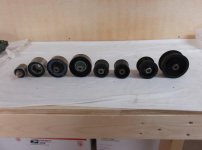:agree:.... Most things for our Spyders are over priced. But what I've noticed is if it doesn't cost hundreds of dollars people won't buy it, because they don't trust it (it's cheap)..
I am also considering making my own belt tensioner. It's not rocket science to make one, just take some ingenuity to get it done right. I should be able to make one for about $50 and a few hours of my time.
Automotive style serpentine belt tensioners are what some of the Spyder tensioners are made of. The tension can be adjusted by the bracket that is made to hold it in place. You basically need a spring loaded wheel/pulley to lightly apply tension/pressure to the lower portion of the belt so it does not flop while accelerating. Automotive style tensioners use bearings that are designed to withstand the rpms that the belt will produce thus being reliable for long travel use and many years of trouble free service.
I am all for those who want to tackle making their OWN tensioners and bracket designs.
Fortunately for those that have limited mechanical knowledge and equipment or more money than time, there is some help out there for the vibration.
As Scotty said, the automotive serpentine tensioners are not suitable for this application. They apply 10X the tension from start-up. They are too strong, not adjustable and designed to keep a lot of tension on 6-8 pulleys with no teeth. You need a 1/2" breaker bar to move them enough just to change a belt.
Spend the money to get the best adjustable tensioner available if your going to the effort and time of making a bracket.
The serpentine automotive idlers will work, but are not made for sustained 6000 RPM in the spyder drive train, but for 2000 RPM on the front of an engine.
While many serpentine idlers use the same 6203 bearing size as does the flat belt composite idlers, some will heat up due to the tight clearance.
Automotive Idlers are usually steel and built much tighter with no play in the bearings, for quietness, low speed and a lot of tension.
The purpose built flat belt composite idlers use the 6203 bearing

also, but with a
C-4 designation, meaning they have 4 times the internal clearance as a regular 6203 bearing.
They are set-up loose and made for a lower tension and much higher sustained speed without burning up, although some can be noisy at times.
I have tried every pulley on the market and have given up trying to re-invent the wheel, the composite flat belt idlers are still the best despite the occasional belt noise. They last a long time if you don't blow the grease out with a pressure washer.
Hope this helps, good luck.

